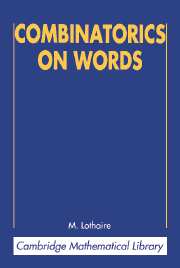Book contents
- Frontmatter
- Contents
- Foreword
- Preface
- Preface to this edition
- Chapter 1 Words
- Chapter 2 Square-Free Words and Idempotent Semigroups
- Chapter 3 Van der Waerden's Theorem
- Chapter 4 Repetitive Mappings and Morphisms
- Chapter 5 Factorizations of Free Monoids
- Chapter 6 Subwords
- Chapter 7 Unavoidable Regularities in Words and Algebras with Polynomial Identities
- Chapter 8 The Critical Factorization Theorem
- Chapter 9 Equations in Words
- Chapter 10 Rearrangements of Words
- Chapter 11 Words and Trees
- Bibliography
- Index
Chapter 1 - Words
Published online by Cambridge University Press: 04 November 2009
- Frontmatter
- Contents
- Foreword
- Preface
- Preface to this edition
- Chapter 1 Words
- Chapter 2 Square-Free Words and Idempotent Semigroups
- Chapter 3 Van der Waerden's Theorem
- Chapter 4 Repetitive Mappings and Morphisms
- Chapter 5 Factorizations of Free Monoids
- Chapter 6 Subwords
- Chapter 7 Unavoidable Regularities in Words and Algebras with Polynomial Identities
- Chapter 8 The Critical Factorization Theorem
- Chapter 9 Equations in Words
- Chapter 10 Rearrangements of Words
- Chapter 11 Words and Trees
- Bibliography
- Index
Summary
Introduction
This chapter contains the main definitions used in the rest of the book. It also presents some basic results about words that are of constant use in the sequel. In the first section are defined words, free monoids, and some terms about words, such as length and factors.
Section 1.2 is devoted to submonoids and to morphism of free monoids, one of the basic tools for words. Many of the proofs of properties of words involve a substitution from the alphabet into words over another alphabet, which is just the definition of a morphism of free monoids. A nontrivial result called the defect theorem is proved. The theorem asserts that if a relation exists among words in a set, those words can be written on a smaller alphabet. This is a weak counterpart for free monoids of the Nielsen–Schreier theorem for subgroups of a free group.
In Section 1.3 the definition of conjugate words is given, together with some equivalent characterizations. Also defined are primitive words, or words that are not a repetition of another word. A very useful result, due to Fine and Wilf, is proved that concerns the possibility of multiple repetitions. The last section introduces the notation of formal series that deal with linear combinations of words, which will be used in Chapters 5–7 and 11.
A list of problems, some of them difficult, is collected at the end.
- Type
- Chapter
- Information
- Combinatorics on Words , pp. 1 - 17Publisher: Cambridge University PressPrint publication year: 1997
- 5
- Cited by

